#Sophus Helle
Text
Let them know that your gaze is terrifying, and that you lift your terrifying gaze. Let them know that your eyes flash and flicker. Let them know that you are headstrong and defiant. Let them know that you always stand triumphant.
"The Exaltation of Inana," Enheduana, trans. Sophus Helle
192 notes
·
View notes
Text
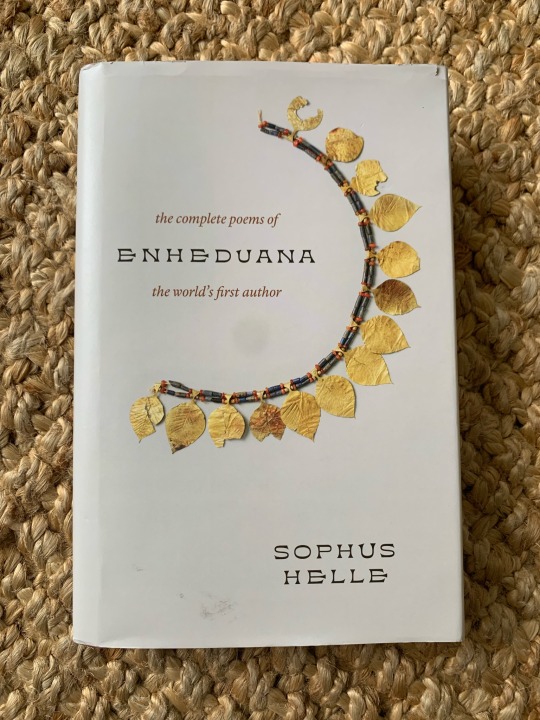
While at Elliot Bay Books, my ears perked up at a casual mention of poetry by “some woman from ancient Sumer or Ur.”
Was it Enheduana???? Yes!
I’m still bummed I missed the exhibit on Enheduana at the Morgan Library.
So, even though I had *just* said that I wasn’t ever going to haul paper books around in my suitcase again, I bought this translation by Sophus Helle.
I’m so glad I did. It’s a great book. Great subject, great writing. I can’t comment on the accuracy of the translation, but the poetry is knockout and the essays are accessible and fascinating.
205 notes
·
View notes
Text
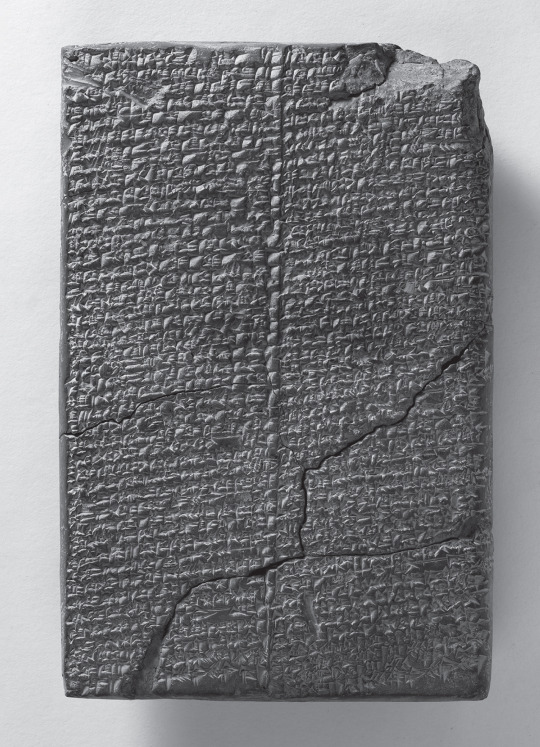
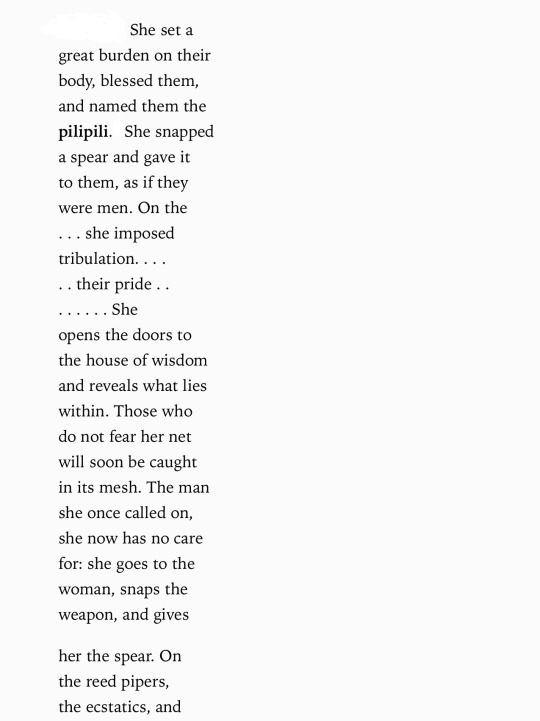

—Enheduana, from “The Hymn to Inana”
Gender-bending in the world’s most ancient authored text, newly translated by Sophus Helle.
From an essay by the translator: “The evidence for activities that sought to actively subvert established gender norms is much clearer when we turn to another and much more motley class of ritual performers. These included the kurĝara, the saĝ-ursaĝ, and the pilipili, as well as several other groups who were associated with the worship of Inana and who performed rituals in which they upended the usual conventions of gender. Ancient texts describe processions in honor of Inana in which the participants would wear female clothes on one side of their body and male clothes on the other. They would brandish weapons, which were the traditional signs of masculinity, as well as weaving instruments, such as spindles and distaffs, the traditional signs of femininity. By mixing and juxtaposing the standard symbols of gender, they would introduce an element of confusion and capriciousness into the conventions of gendered behavior: if the same person could wear both female and male clothes, viewers were led to ponder the nature of gender itself. It is highly likely that the various groups, such as the kurĝara and the saĝ-ursaĝ, would subvert gender norms in different ways: some were perhaps individuals who generally appeared to be female but performed stereotypically male actions, others the reverse, but because of the limitations of our sources, it is difficult to reconstruct the differences between them. Either way, these groups were all engaged in a playful scrambling of what was thought to be typically male and typically female.”
On the pilipili: “Inana then blessed them, named them, and gave them a snapped spear ‘as if they were a man’ (ll. 80–81). The passage implies that they were generally seen as women and that they announced their distance from normative gender by carrying a broken emblem of maleness. However, the text identifies them not with one gender or the other but with the transition between genders, referring to them as ‘the changed pilipili’ (l. 88). Together with the reed pipers, the kurĝara, the saĝ-ursaĝ, and the ecstatics, they are depicted as ritual lamenters: Inana ‘makes them weep and wail for her,’ so that they ‘exhaust themselves with tears and tears’ (ll. 87, 90).”

#literature#poetry#Inana#inanna#Enheduana#assyriology#Sophus helle#enheduanna#genderqueer#nonbinary#gender nonconforming#Sumerian literature
154 notes
·
View notes
Text
"The Epic of Gilgamesh is probably the oldest and the foundation of epic heroes story, but is also not your typical heroes' tale. If you went to the epic expecting men versus monster glory, you will be disappointed. The Epic of Gilgamesh is about a rollercoaster of restless emotions."
-Sophus Helle, on The Ancient Podcast : Rise of Enkidu
#the epic of gilgamesh#gilgamesh#enkidu#sophus helle#me : YASSS ENCORE ENCORE#They say the next part is coming and I am IMPATIENT#I already love Helle's essays thus also loves how he gushed about Gilgamesh's emotion#(also his breathy restrained laugh everytime he said “ Enkidu is a really really good friend of Gilgamesh”)#(spoiler alert : his restraint didn't last long)#independent post
29 notes
·
View notes
Quote
...though practically universal, the silencing of women's speech is not a simple matter. It can have counterintuitive and ironic effects, as is the case in Gilgamesh. In a nutshell, male anxiety about women's speech, and the patriarchal belief that women should not speak at all, leads to a literary fantasy of women's speech being extremely influential.
The epic is a story that was told by men to men about men, with "women functioning as supporting and subsidiary characters in the cast," in the words of Assyriologist Rivkah Harris. Women stand at the outer edges of the epic, but ironically, those edges can be a powerful place to be. Precisely because women are excluded from the male sphere of decisions, they hold a strange power over it. This is the logic of an anxious male privilege. To maintain an exclusive grasp on power, men restrict the speech of women and so come to imagine that if it were not restricted, women's speech would hold great danger. That fear in turn becomes a reason to curtail their speech all the more. In Gilgamesh, the few women who speak do so to great effect. This is not because the epic is feminist, but, I believe, because it rests on the cultural assumption that women's speech is a rare, dire, and dominant force, which can change the lives of men and so must be treated with constant suspicion.
from Gilgamesh: A New Translation of the Ancient Epic by Sophus Helle
#gilgamesh#sophus helle#what I'm reading#this really is it huh#I feel like you could write something about how the emphasis during the height of the me too movement about 'listening to women's voices'#spawned the vicious backlash we're seeing now where women's testimony about their own lives as seen as dangerous and illegitimate
86 notes
·
View notes
Text
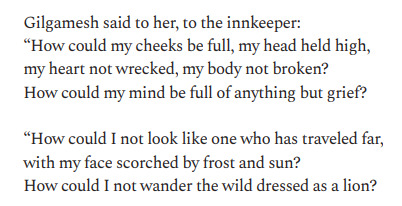

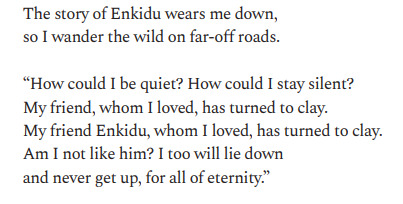

"The story of Enkidu wears me down,
so I wander the wild on far-off roads."
#gilgamesh#ancient history#history#epic poetry#sophus helle#grief#writing#what is grief if not love persevering#enkidu#shiduri#sidurri#i think about this a lot
29 notes
·
View notes
Photo

Gilgamesh: A New Translation of the Ancient Epic
By Sophus Helle.
Design by Jenny Volvovski.
4 notes
·
View notes
Note
re: the Epic of Gilgamesh: it’s absolutely worth reading! And not too dense. I would 1000% recommend finding a twenty-first century translation, though—archaeologists find new tablets and fragments every once in a while, so anything older than the 2000s won’t be complete to what we know now. Something significant was discovered in 2016 iirc, so, if you can find a version that takes that into account, I think that would be ideal. I read Maureen Kovacs’s translation from the 1980s which was definitely composed for an academic audience rather than a popular one, which I did like but also I know it’s out of date and I’m also looking for a more modern translation… I hear good things about Stephen Mitchell’s 2004 translation, tho it takes liberties. Benjamin Foster’s (2019) and Sophus Helle (2022) both sound promising.
Oooh, thank you! Good to know that i should look for something recent. In looking up the ones you mentioned I found an interview with Benjamin Foster where he says his intended audience is a college literature class and he prioritized an engaging reading experience over including a lot of academic detail, so that sounds like a pretty good fit for my level of knowledge & what I'm looking for (I am no Assyriologist lol, just interested in the story and wanting to experience a relatively-close-to-original version of it). Sophus Helle's also looks interesting, I'd be curious to read the essays that are included in it. Alas, it looks like my library has neither, so I'll have to look farther afield. Thanks for the recs!
#stars answers#book recs#tbr#gilgamesh#the Overly Sarcastic Productions telling of the epic of gilgamesh piqued my curiosity#and i've just seen enough quotes from translations of it around tumblr at this point#that i'm interested in reading it myself#i haven't read many texts like this outside of required reading for classes but it's a cool feeling to feel genuinely motivated to do so!#and the odyssey and beowulf were pretty fun when i read them in my senior humanities class#also i did not know Assyriologist was a word/academic discipline before i read that interview but now i do! fun
24 notes
·
View notes
Text
(starting discourse....) Thoughts on the sophus helle translation of gilgamesh ? Personally I did not really care for it (I am a Maureen kovacs-head but a lot are good). But for the record, I did like the blank spaces!!!! More how he interpreted the text and the flow/rhythm that bothered me
20 notes
·
View notes
Text
a syllabus for understanding the psyche of ieva feytouched

movies
the lord of the rings trilogy (must watch more than 1x)
emma (2020)
marie antoinette (2006)
the royal opera house's nutcracker (2018 production)
anime
mushi-shi
howl's moving castle
books pt. 1: for thinking
letters on cézanne, rainer maria rilke
the book of hours, rainer maria rilke
invisible cities, italo calvino
gilgamesh, tr. by sophus helle
books pt. 2: for feeling
the little white horse, elizabeth goudge
the complete book of flower fairies, c. m. barker
the complete brambly hedge, jill barklem
the wind in the willows, kenneth grahame
the last unicorn, peter s. beagle
deathless, c. m. valente
in the night garden, c. m. valente
east of the sun and west of the moon, illustrated by kay nielsen
artworks
carnation, lily, lily, rose, john singer sargent
the execution of lady jane grey, paul delaroche
fireworks in the park, konstantin somov
cafe window, paris, gordon parks
it hurts and i'm lonely, nicholas rae klein
the legend of saint george: the rescue, maximilian liebenwein
poems
the patience of ordinary things, pat schneider
here, there are blueberries, mary szybist
sleeping in the forest, mary oliver
arrhythmia, hailey leithauser
because you asked about the line between prose and poetry, howard nemerov
scents
l'heure bleue (guerlain)
temptation (alkemia)
dorian (bpal)
flavours
umeshu plum wine
smoked salmon toast with cream cheese and dill
homemade poppyseed challah with salted butter
dark chocolate-covered marzipan
moondrop dreams tea by bird and blend
music
marie antoinette OST
the nutcracker, op. 71, act II: no. 14a, pas de deux. andante maestoso - tchaikovsky
mary on a cross - ghost
practical assignments
go horseback riding in nature at least once
swim in the ocean (do not open eyes underwater)
join a game of dungeons & dragons
go on a walk where you pay attention to all the smells you can detect
buy yourself flowers at the supermarket
write a poem and then delete it; write another poem and then post it
draw something that fascinates you every day for a month
travel alone. be homesick. stay homesick when you return home
#about me#these are a few of my favourite things#this has been in my drafts for a while so why not post it. if anyone else wants to steal the format & do this i encourage it!!
37 notes
·
View notes
Text

This hymn in praise of writing just punched me in the chest. We weave writing! New things are born!
80 notes
·
View notes
Text
Mildly Interesting Reads: May 2024
Some Mildly Interesting books in mostly anthropology, linguistics & whatnot. It's the 15th and I have nitro so
Books
Schneider, David. Matrilineal Kinship. A book that discusses crosscultural comparisons in matrilinealities, and how they often interact with patriarchal structures of kinship
Haring, Lee. How to Read a Folktale: The Ibonia Epic from Madagascar This documents an oral epic from Madgascar.
Hunwick, John. Timbuktu and The Songhay Empire Discusses the chronology and kingsly lines of the rise of the Songhay Empire in the Inland Niger Delta.
Hardacre, Helen. Shintō: A History. As it says on the tin, the history of Shintō and the bases of its beliefs, and later its organization.
Stenzel, Kristine (ed.). On this and Other Worlds: Voices from Amazonia. A narrative and anthropological-oriented documentations of Amazonian narratives and devices thereof.
Nijdam, Han. Frisian Land Law. A book that focuses on the Frisian resistance to feudalism in medieval Europe as it kept Germanic laws akin to those in the north.
Kirch, Patrick & Green, Roger. Finding Hawaiki. A comparative cultural book that discusses about the origins and shared mythologies of Polynesian dispersal.
Papers
Stassen, Laurent. AND-languages and WITH-languages. A typological profile of conjunctives (think of Chinese as a WITH-language and English as an AND-language).
Blench, Roger. Things Your Classics Master Never Told You: A Borrowing from Trans-New-Guinea to Latin. On the standing of the lexeme *mugu "banana" and its diffusion to Latin musa, and by proxy Arabic muz
Helle, Sophus. Only in Dress?. A critical analysis at the assinu and the third genders in Mesopotamia.
Erhart, Kelsie. Assumptions About the Assinu. Another analysis of the assinu by Kelsie Erhart.
Misc
The Global Jukebox. A directory of a lot of crosscultural folk music.
7 notes
·
View notes
Text
from The Hymn to Inana
by Enheduana (~2300 BCE)
tr. Sophus Helle
restless, she straps
on her sandals. She
splits the blazing,
furious storm, the
whirlwind billows
around her as if
it were a dress.
#poetry#poem#writers on tumblr#writing#storm#sky#enheduanna#ancient history#ancient egypt#ancient greece#ancient art#history#dress
6 notes
·
View notes
Text
I carried the basket
of offerings, I sang
the hymns of joy.
Now they bring me
funeral gifts -- am I
no longer living?
I went to the light,
but the light burned
me; I went to the
shadow, but it was
shrouded in storms.
My honey-mouth
is full of froth, my
soothing words are
turned to dust.
-Excerpt from "The Exaltation of Inana" in The Complete Poems of Enheduana The World's First Author and translated by Sophus Helle
7 notes
·
View notes
Quote
Texts are transformed by those who read them.
Sophus Helle, introduction to Enheduana: The Complete Poems of the World’s First Author
#what I'm reading#sophus helle#I really enjoyed this thank you sophus for your contributions to the culture
8 notes
·
View notes
Note
sorry if you've answered this somewhere already - out of the books you've read this year, which three did you enjoy the most? and out of the fics you've read this year, which three did you enjoy the most?
All the fics I loved this year I mostly recced as and when on my fic recs tag, and tbh I don't think I read enough TF fic this year to really sort them into a top three- if I loved it, I put it up somewhere, mostly. If I had to pluck three out, I'd say Red Gold (god tier Rodimus characterisation), Your Own Hands (a reread, but still my favourite taraprowl fic, it gets the nod) and... oh actually. Okay, this one isn't Transformers, but I have to give a shout out to this Lupin III interactive fiction Twine fic that is an INCREDIBLE use of form to do something very ambitious with a fic. It's so good! If I do have any even casual Lupin enjoyers following me, definitely take a look.
The books, discounting one I already recommended:
Gilgamesh: A New Translation of the Ancient Epic, translated by Sophus Helle, is probably the single best book I read this year. I love the Epic of Gilgamesh very much, and this is a lovely translation, but what tipped it over for me was his essays after the poem where he discusses it in a way that is both accessible and also gets into the finer points of how to approach and appreciate the poem in a wider context. His discussion of the way gender plays into the power structures of the poem and the overview he gives of contemporary Iraqi cultural reaction to the poem were especially interesting. Especially after the former, I am really excited to read his book published this year translating and discussing all the poems of Enheduanna! Highly recommended. God I love Gilgamesh.
I reread The Invention of Love by Tom Stoppard, a play set in the Victorian era based (very loosely) around the life, death and afterlife of A. E. Housman. It's a really dense play on a lot of levels, mostly well known for being really obtuse. It has about six deeply obscure references to classical scholarship per sentence, twice as many offhand references to Victorian Oxbridge Stuff that go unremarked on, the timeline constantly jumps back and forth, a meaningful chunk of it is a dead guy talking to his younger self on the Styx, and they spend most of that time discussing the minutiae of latin grammar in poetry (with absolutely no dumbing down for the audience) as a metaphor for their unrequited yearning. I believe when it premiered on Broadway, they basically had to provide a book of like. Explanations as to what the fuck every other conversation was referencing. But I love it, even though I understand maybe fifty percent of it, because it's so beautifully written and clever and funny and able to withdraw from the ever-present threat of sentimentality. One of my favourite plays of all time. The 'poetical feelings are a peril to scholarship' exchange gets me every time. On my knees begging for a fucking proshot to be made of a performance one day.
A Play of Bodies: How We Perceive Videogames by Brendan Keogh is my favourite nonfiction by a narrow margin. It's a book that outlines a way to approach analysis and criticism of video games through a phenomenological framework, and it made me completely re-think how I understand what the 'text' of a video game is. This one is very much a work of academia, though it does give a lot more overview of what phenomenology is than, say, the average philosophy text is likely to, since it sits more in the 'games studies' area where that's not taken as much for granted, so it's not totally inaccessible. It made me think a lot about how video games exist as a unique medium in ways that completely diverge from the standard narrative of 'videogames are unique due to interactivity'. It takes a lot for me to be impressed by writing about games, given just how much of it I read/have read, but Keogh never disappoints.
12 notes
·
View notes